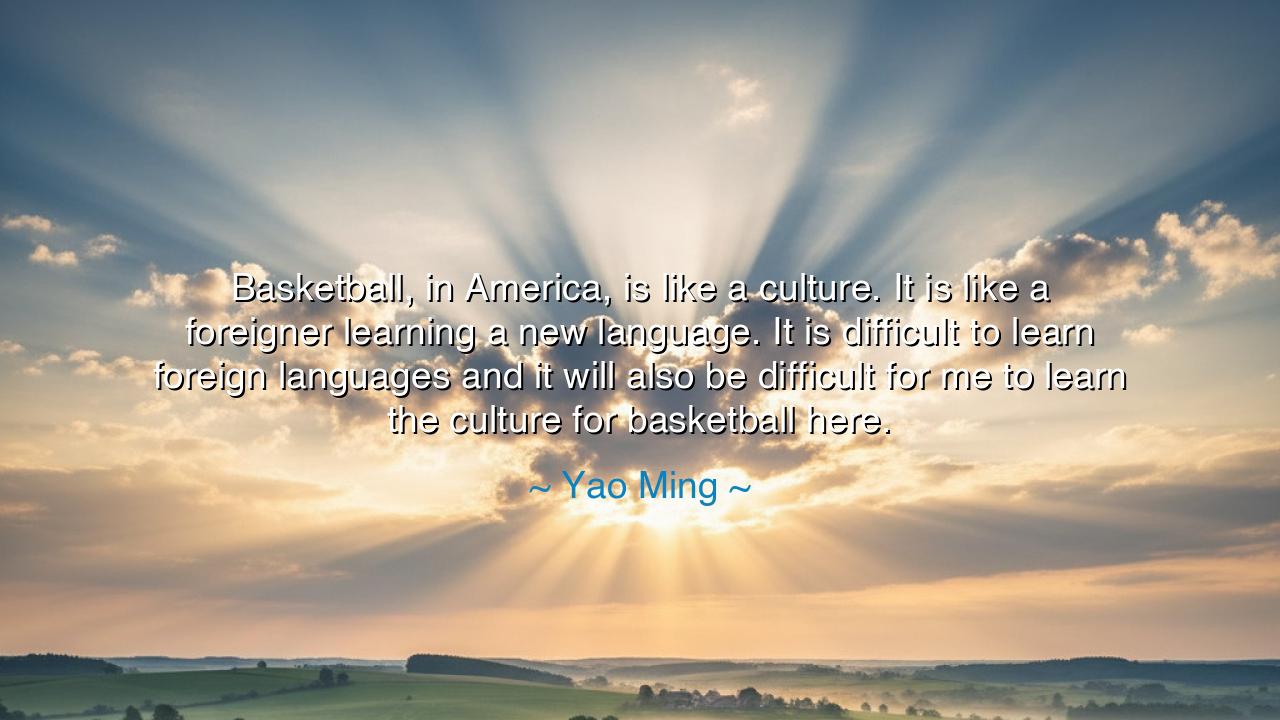
Basketball, in America, is like a culture. It is like a foreigner
Basketball, in America, is like a culture. It is like a foreigner learning a new language. It is difficult to learn foreign languages and it will also be difficult for me to learn the culture for basketball here.






In the chronicles of sport and culture, few voices have spoken with the quiet humility and wisdom of Yao Ming, whose journey bridged continents and hearts. He once said: “Basketball, in America, is like a culture. It is like a foreigner learning a new language. It is difficult to learn foreign languages, and it will also be difficult for me to learn the culture for basketball here.” In these words lies not merely the reflection of an athlete, but the eternal truth of adaptation—the struggle of the human spirit to find harmony within a world both strange and wondrous.
When Yao Ming came from Shanghai to the United States, he carried with him not only the expectations of a nation, but also the hopes of bridging East and West. In his homeland, basketball was a beloved game, yet in America it was something deeper—a living rhythm, a shared language spoken in playgrounds, arenas, and hearts. To step into that world was not only to compete, but to translate himself into a new form of understanding. His challenge was not simply to master the playbook, but to grasp the unspoken poetry that infused every pass, every movement, every roar of the crowd.
The ancients understood that to learn another language is to enter another soul. In Greece, travelers sought wisdom from Egypt and Persia; in China, scholars translated Buddhist scriptures from Sanskrit, striving to carry meaning across the barriers of words and thought. Each act of translation was also transformation, demanding patience, humility, and faith. So it was with Yao Ming. His statement reveals a recognition that culture, like language, is not learned through study alone—it must be lived, absorbed through experience, and understood through empathy.
There is also a deeper wisdom in his struggle. For every age and every nation, there comes a moment when one must step beyond the familiar and engage with the unknown. The difficulty of learning a new culture is not failure—it is the crucible of growth. Like the blacksmith who tempers steel through heat and resistance, Yao’s journey through confusion, doubt, and adaptation forged not just a greater player, but a greater human being. In this way, his path mirrors that of the great explorers and thinkers who left home to find truth beyond their borders.
History offers us countless parallels. When Matteo Ricci, the Jesuit scholar, traveled to Ming China in the 16th century, he faced the same challenge: to convey his faith and knowledge across cultural and linguistic chasms. He learned the language, the etiquette, and the philosophies of the scholars he met, earning their respect not through dominance, but through humility. Like Yao, he discovered that mastery in a foreign world requires not the erasure of self, but the expansion of self—a heart capable of embracing more than one truth.
Yao’s words also serve as a reminder of the universality of human struggle. Whether one steps into a foreign land, a new career, or an unfamiliar way of thinking, the essence of growth remains the same. The first steps are slow, the grammar awkward, the mistakes frequent. Yet within that struggle lies the beauty of transformation. The difficulty of learning becomes the melody of perseverance, and over time, what once felt foreign becomes a second nature—an integration of both old and new selves.
For the listener, the lesson is both simple and profound: approach new challenges as Yao approached basketball—with humility, openness, and endurance. Do not shrink from the unfamiliar. Let every obstacle become a teacher, every misstep a word in the new language of your becoming. In learning from others, you expand the boundaries of your own being.
Thus, Yao Ming’s reflection becomes more than a statement about sport—it becomes a parable about life itself. “Basketball, in America, is like a culture… it will be difficult for me to learn.” But difficulty is the doorway to wisdom. In the effort to understand, to translate, and to connect, the soul grows stronger, broader, and more compassionate. For in every foreign tongue, in every new rhythm, there is a deeper invitation—to see the world not as separate nations or games, but as one vast field of shared humanity, where all may learn, grow, and play together.






AAdministratorAdministrator
Welcome, honored guests. Please leave a comment, we will respond soon